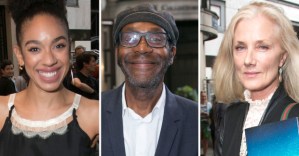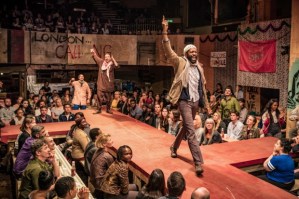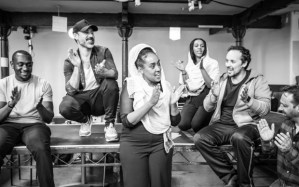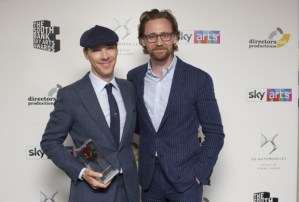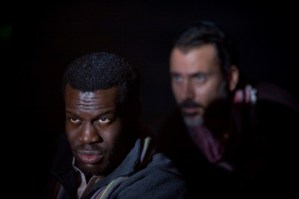Review: The Jungle (Playhouse Theatre)
Joe Murphy and Joe Robertson’s play about the Calais refugee camp transfers from the Young Vic
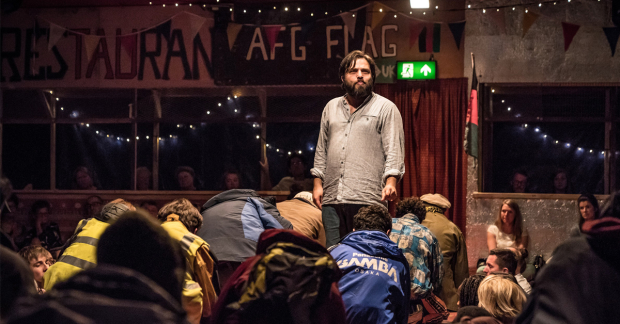
© Marc Brenner
Like people, plays can change when displaced. A West End transfer for a drama peopled by refugees might strike you as jarring – red velvet on a blue plastic tarpaulin. If anything, it works in The Jungle's favour, sharpening the discrepancy between where we're sat and what we see. That you feel the extent of your privilege here is a credit to Joe Murphy and Joe Robertson's piece, an amalgamation of their experiences of the migrant camp at Calais. The Jungle asks us to witness, rather than weep. It demands our empathy, never our pity.
Even more than at the Young Vic, where re-configurations are the norm, Miriam Buether's semi-immersive design trips you up – a proper disruption of theatrical space. Behind the white marble foyer-bar, instead of stalls and stage, is a temporary, makeshift, MDF room: Salar's Afghan restaurant in a corner of Calais. To enter, you walk past crumpled campbeds and a few shelves of stock, through a rudimentary kitchen, pungent spices simmering on the hob. It's a jolt. Flyers handed out, cakey mud underfoot. It's as if the theatre itself has been squatted, occupied by uninvited guests; political theatre in a place of entertainment.
Not that this is an immersive environment: the Calais Experience or something like that. It's more porous than that, and more self-aware: a theatrical proxy for a place that must be so, so much worse. Above, another audience looks down from the circle, renamed the White Cliffs of Dover as another little trip. The Jungle is keenly aware of its reality in the room – it knows its theatre – and those beyond.
Inside the restaurant, different nationalities jostle and shout. 5497 people live side by side, sometimes fractiously, on a site by a motorway with cars passing by. Whenever traffic clogs up, they race to play the game – 'douga', an attempt to stowaway in a vehicle and get to the UK. It's dangerous: The Jungle begins with a teenage body brought in from the road. To find safety, these refugees risk their lives. With them are a bunch of bedraggled British volunteers, all running from a country they struggle to see as home.
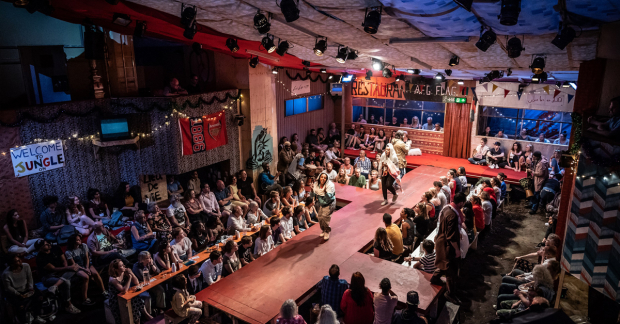
© Marc Brenner
Second time round, you see quite how well-constructed The Jungle is – as accomplished a first script as there's been in years. Framed as a piece of forum theatre, its Lebanese director Safi (Ammar Haj Ahmad) nudging characters on, it has enough self-awareness to be blunt and on-the-nose (though the ethics of Brits couching their time at Calais through the eyes of a refugee is questionable.)
The plot's beautifully counterpointed. The gleeful childishness of 15 year-old Afghan Norullah, always monkeying around, contrasts with the dead stare of Okot (John Pfumojena), physically and mentally scarred by all he's undergone. Ben Turner – fantastic as Salar – stresses the grafting restauranteur as a glinting entrepreneur, but then so is Rachid Sabitri's trafficker, who hands his charges an onion to keep guard dogs away. Where there are people, there is opportunity. Amongst the volunteers, Rachel Redford's teacher Beth gets too attached, while Alex Lawther's wet-eared Sam, just out of Eton, treats the whole thing as a conundrum to be solved. Jo McInnes is pragmatic and jaded as Paula, Dominic Rowan over-idealistic as Derek, a man who sees the camp as a chance to start again: a new Jerusalem.
A play that pulls in different directions at once suits an issue with no easy solutions. To put down roots in Calais and improve conditions would be to admit defeat and to settle (in both senses). Zhangal teethers between community and anarchy and when British volunteers attempt to impose order, it raises the spectre of colonialism: one renames the camp, another divides it with lines. Make no mistake, Britain carries some blame: for Afghanistan, Libya, its rule in Eritrea. The West has always looked after its own at others' expense. Humans do: a chorus of "Glory, Glory, Man United" ends with "And f*ck the Arsenal". Ironically, the recent relative prosperity that brought mobile phones makes fleeing poverty a possibility and, in Calais, refugees running from war mingle with economic migrants seeking more.
This is the most important play of the decade, not just because it covers the big issue of our times so comprehensively, but because it humanises it – and at a time when attitudes to refugees are hardening worldwide. Each here has a reason for refugee, a route and a story of their own. Powerful, necessary theatre.



